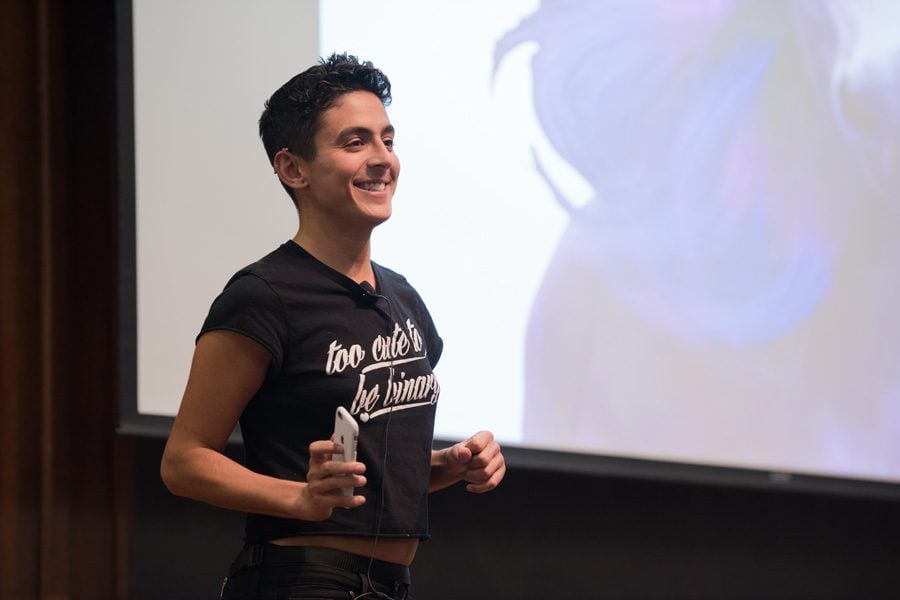Intersex activist calls for increased awareness about ‘corrective surgeries’
Jeffrey Wang/Daily Senior Staffer
Intersex artist and activist Pidgeon Pagonis talks about issues surrounding sex assignment surgeries at Harris Hall Thursday. Pagonis was selected as the Rainbow Alliance’s weekly keynote speaker for Queer and Trans* Empowerment Month.
October 14, 2016
Intersex activist Pidgeon Pagonis called for increased awareness on the impact of sex assignment surgeries on intersex individuals Thursday.
“It’s a social emergency,” Pagonis said during Rainbow Week’s keynote address.
Pagonis — who uses they, them, their pronouns — spoke to about 50 people in Harris Hall at an event hosted by Rainbow Alliance. Pagonis spoke on being intersex and showed their documentary, “The Son They Never Had: Growing Up Intersex,” which was followed by a Q&A.
Pagonis is Chicago-born activist who advocates for the intersex community and bodily justice. With over 10 years of experience, they have been published in the academic journal Narrative Inquiry in Bioethics and were honored by the White House as an LGBTQ “Champion of Change” in 2015.
Pagonis used their personal experience to advocate against intersex surgery. Pagonis said as a child they underwent “corrective surgeries” based on misinformation from doctors.
Pagonis was born with ambiguous genitalia, not having a fully-formed penis or vagina. About 1 percent of people are intersex, which is roughly equivalent to the number of natural-born redheads, Pagonis said.
Doctors informed Pagonis’ parents that Pagonis would develop gonadal cancer if their gonads were not removed. Pagonis said they underwent a surgery during which their gonads were removed and as well as subsequent clitoral surgeries.
But Pagonis and their parents later learned that the surgeries were medically unnecessary. Surgery is medically unnecessary in nearly 90 percent of intersex cases, Pagonis said during the presentation. Doctors often perform “corrective surgeries” in response to the birth of an intersex child, getting parental consent under the pretense of falsified health risks, they said.
As an adult, Pagonis said they are fighting back against intersex genital surgeries and “sex assignment.”
“Intersex surgery is a form of assault,” Pagonis said.
The problem with intersex surgery lies in misinformation, Pagonis said. They said children should have the right to choose their gender later in life, but if parents choose surgery, parents should have access to accurate information.
Those fighting against intersex surgeries have been hindered by the lack of data on the long-term emotional and physical effects of such surgeries, Pagonis said. But Pagonis still encourages individuals to fight back against these surgeries and the gender binary that accompanies sex assignment at birth. They suggest protesting hospitals to stand against medically unnecessary procedures and supporting national legislation on the topic of intersex issues.
Thursday’s talk was part of Queer and Trans Empowerment Month, a larger movement on Northwestern’s campus, which is celebrated every October. The goal of the month is to educate and increase conversation about sexuality and gender.
“The intersex population is a very underserved one,” said Ross Cohen, a Communication junior and member of Rainbow Alliance’s executive board.
Communication junior Rachel Stamler-Jonas attended the talk and said the dialogue introduced by Pagonis is crucial.
“We need to talk to our friends about sex and gender,” Stamler-Jonas said. “We can’t keep it a taboo topic.”
Upcoming events involving intersex issues include Intersex Awareness Day on Oct. 26 and Intersex Day of Solidarity on Nov. 8.
Correction: A previous version of this story misspelled Rachel Stamler-Jonas’ name. The Daily regrets the error.



